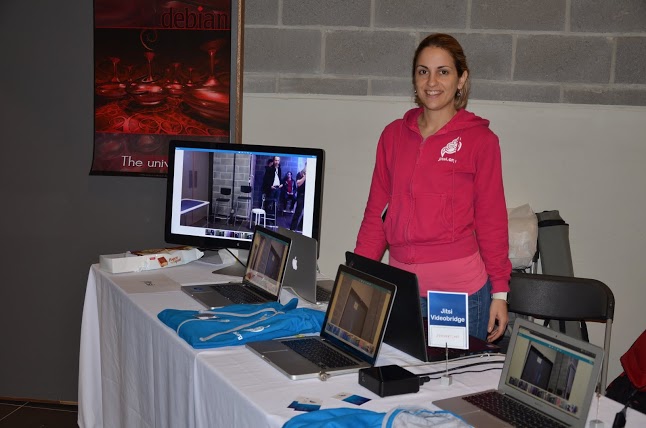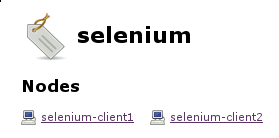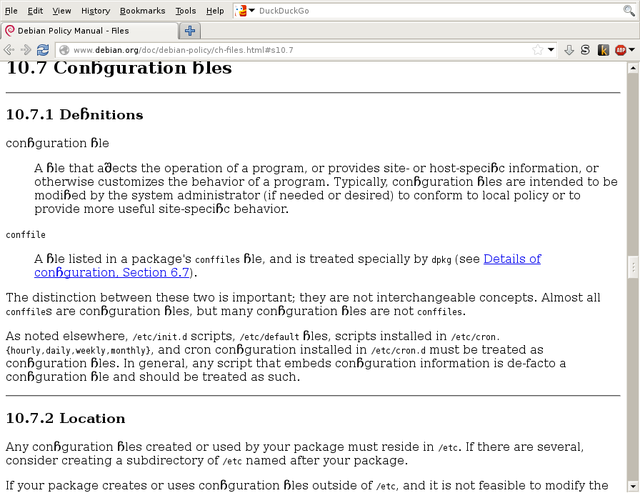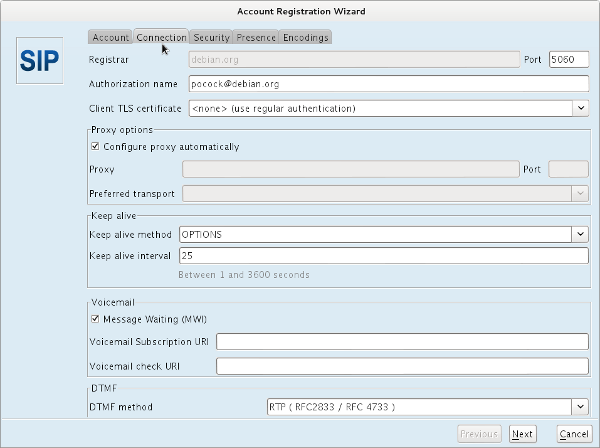Some days ago I decided to upgrade my laptop from stable to testing.
I had tried Jessie since several months, in my husband s laptop, but that was a fresh install, and a not-so-old laptop, and we have not much software installed there.
In my netbook (Compaq Mini 110c), with stable, I already had installed
Pumpa, Dianara and
how-can-i-help from testing, and since the freeze is coming, I thought that I could full-upgrade and use Jessie from now on, and report my issues and help to diagnose or fix them, if possible, before the freeze.
I keep Debian stable at work for my desktop and servers (well, some of them are still in oldstable, thanks
LTS team!!), and I have testing in a laptop that I use as
clonezilla/
drbl server (but I had issues, next week I ll put some time on them and I ll write here my findings, and report bugs, if any).
So! let s go. Here I write my experience and the issues that I found (very few! and not sure if they are bugs or configuration problems or what, I ll keep an eye on them).
The upgrade
I pointed my /etc/apt/sources.list to jessie, then apt-get update, then apt-get dist-upgrade. (With the servers I am much more careful, read the release notes, upgrade guides and so, or directly I go for a fresh install, but with my laptop, I am too lazy).
I went to bed (wow, risky LArjona!) and when I got up for going to work, the laptop was waiting for me to accept to block root from ssh access, or restart some services, and so. Ok! the upgrade resumed but I have to go to work and I wanted my laptop! Since all the packages were already downloaded, I closed the lid (double risky LArjona!) unplugged it, put everything in my bag, and catched the bus in time
:)
At the bus, I opened again the lid of my laptop (crossing fingers!) and perfect, the laptop had suspended and returned back to life, and the upgrade just resumed with no problem. Wow! I love you Debian! After 15 minutes, I had to suspend again, since the bus arrived and I had to take the metro. In the metro, the upgrade resumed, and finished. I shutdown my laptop and arrive to work.
Testing testing
:)
In a break for lunch, I opened my brand new laptop (the hardware is the same, but the software totally renewed, so it s brand new for me). I have to say that use xfce, with some GNOME/GTK apps installed (gedit, cheese, evince, XChat ) and some others that use Qt or are part of the KDE project (Okular, Kile, QtLinguist, Pumpa, Dianara). I don t know/care too much about desktops and tweaking my desktop: I just put the terminal and gedit in black background, Debian wallpaper is enough dark for me so ok, put the font size a bit smaller to better use my low-vertical-resolution, and that s all, I only go to configure something else if there s something that really annoys me.
My laptop booted correctly and a nice, more modern LightDM was greeting me. I logged in and everything worked ok, except some issues that follow.
Network Manager and WPA2-enterprise wireless connections
I had to reconfigure some wireless connections in Network Manager. At the University we use WPA2-enterprise, TTLS + PAP. I had stored my username and password in the connection, and network manager seemed to remember the username but not the password. No problem, I said, and I wrote it when it asked, but the Save or OK button was greyed out. I could not click it.
Then I went to edit the connections, and more or less the same, it seems that I could edit, but not save the (new) configuration. Finally, I removed the wireless connection and created it again, and everything worked as a charm.
This, I had to do it with the two wireless in my University (both of them are WPA2-enterprise TTLS + PAP). At home, I have WPA2 personal, and I had no issues, everything worked ok.
This problem is not appearing in a fresh install, since there are no old configs to keep.
Adblock Plus not working any more
I opened Iceweasel and I began to see ads in the webpages that I visited. What? I checked and Adblock plus was installed and activated I reinstalled the package xul-ext-adblock-plus and it worked again.
Strange display in programs based on Qt
When I opened Pumpa I noticed that the edges of the windows where too rough, as if it was not using a desktop theme. I asked to a friend that uses Plasma and he suggested to install qt4-qtconfig, and then, select a theme for my Qt apps. It worked like a charm, but I find strange that I didn t need it before in stable. Maybe the default xfce configuration from stable is setting a theme, and the new one is not setting it, and so, the Qt apps are left barefoot .
With qtconfig I chose a GTK+ Style GUI for my Qt apps and then, they looked similar to what I had in stable (frankly, I cannot say if it was similar or exactly the same , but I didn t find them strange as before, so I m fine).
Strange display in programs from GNOME
Well, this is not a Jessie problem, it s just that some programs adopted the new GNOME appearance, and since I m on xfce, not on GNOME, they look a bit strange (no menus integration, and so). I am not sure that I can run GNOME (fallback, classic?) in my 1 GB RAM laptop, I have to investigate if I can tweak it to use less memory, or what.
I m not very tied to xfce, and in fact it does not look so light (well, on top of it, I don t run light programs, I run Iceweasel, Icedove, Libreoffice, and some others). At work I use GNOME in my desktop, but with GNOME shell, not the fallback or classic modes, so I m thinking about giving a chance to MATE or second chance to LXDE. We ll see.
Issues when opening the lid (waking up from suspend)
This is the most strange thing I found in the migration, and the most dangerous one, I think.
As I said before, I don t tweak too much my desktop, if it works with the default configuration. I m not sure that I know the differences between suspend, hibernate, hard disks disconnections and so. When I was in stable, and I closed the lid of my laptop, it just shutdown the screen, then I heard something like the system going to suspend or whatever, and after some seconds, the harddisk and fans stop, the wireless led turns off, and the power led begins to blink. Ok. When I open the lid, then it was waking up itself (the power led stayed on, the wireless led turns on, and when I tap the touchpad or type anything, the screen was coming, with the xscreensaver asking for my password). Just sometimes, when the screen was turning on, I could see my desktop for less than a second, before xscreensaver turns the background black and asks for the password.
Now since I migrated to Jessie, I m experiencing a different behavior. When I close the lid, the laptop behaves the same. When I open the lid, the laptop behaves the same, but when I type or tap the touchpad and xscreensaver comes to ask the password, before than I can type it, the laptop just suspends again (or hibernates, I m not sure), and I have to press the power button in order to bring it back to life (then I see the xscreensaver again asking for the password, I type it, and my desktop is there, the same as I left it when I closed the lid).
Strange, isn t it?
I have tried to suspend my laptop directly from the menu, and it comes to the same state in which I have to press the power button in order to bring it back to life, but then, no xscreensaver password is required (which is double strange, IMHO).
Things I miss in Jessie
Well, until now, the only thing I miss in Jessie is the software center. I rarely use it (I love apt) but I think it makes a good job in easing the installation of programs in Debian for people coming from other operative systems (specially after smartphones and their copied software stores became popular).
I hope the maintainer can upload a new version before the freeze, and so, it enters in the release. I ll try to contact him.
Update 2014/07/20: Julian Andres Klode, maintainer of software-center, just replied (see his comment below) and pointed to GNOME Software (gnome-packagekit) as alternative. I just installed and it looks neat and nice. I m very happy!
TODO
I have a Debian stable laptop at work (this one with xfce + GNOME), I ll try to upgrade it and see if I see the same problems that I notice in mine. Then, I ll check the corresponding packages to see if there are open bugs about them, and if not, report them to their maintainers.
I have to review the wiki pages related to the Jessie Desktop theme selection, I think they wanted the wallpaper to be inside before the freeze. Maybe I can help in publicity about that, handle the votings and so. I like Joy, but it s time to change a bit, new fresh air into the room!
Filed under:
My experiences and opinion Tagged:
Contributing to libre software,
Debian,
English,
Free Software,
Moving into free software 
 = Fun and Profit with lirc
== Getting the basics
A couple weeks ago I got myself a small USB Infrared Transceiver from the
people at iguanaworks.
It comes in different models and I got the dual socket one that allows me
to hook up external IR emitters. The goal was to remote control my stereo from
my desktop machine, so using wired IR blasters gives me the flexibility I need
with the wiring.
They provide Debian packages built for some version of Ubunutu from their
website. I wanted to build them from source, so apt-get source from
their repository it is. The build process of the package
is pretty broken -- it assumes there already is an iguanair user for instance.
If somebody could package this up properly for Debian that'd be real nice. And who
knows, maybe upstream would appreciate that as well. At first glance the software
looks free enough.
Once iguanair has been built and installed, lirc needs a recompile
-- it will pick up the iguanair library automatically.
Their Getting Started docs
are actually pretty good.
== Learning the IR codes
Anyway, once the software was set up, I needed the IR-codes to send to my Denon.
There are a couple of databases for varios remote controls and receivers on the
internet, but I didn't find a single entry for my old Denon AVR-1600RD.
Fortunately lirc alls you to learn codes off a remote control you already have,
and since the iguana device also comes with a receiver, I could use irrecord
to get the needed magic bytes for commands like power on/off, mute, volume up/down.
This actually worked quite well, the only problem was realizing that the IR blasters
are really picky about being properly aligned and close to the receiver (my Denon).
Once I got that right, all the recorded codes worked.
lircd.conf for Denon AVR-1600RD
== Putting it all together
I can now use this to mute my stereo using
irsend send_once denon KEY_MUTE for instance.
What I also wanted to get out of this was that the stereo should
be shut off automatically when my machine goes to sleep, or
when I haven't used it in a while.
Since my Denon only has a power toggle command and does not appear to have a
discrete power-off command -- at least I don't know it -- I needed something
on my system to keep state, and it means I no longer should use my real remote
control or else things will get out of sync.
I have written a small wrapper script that does this for me -- stereo.
It's in /usr/local/bin .
=== Initialisation
On boot, the script creates its state file when called with the init
command. There is a small init script that takes
care of this, as well as turning off the stereo when the machine reboots
or powers off.
=== Power off on suspend
In addition to powering off the stereo when the machine goes down,
I also want it to do that when it goes to sleep. Enter /etc/pm/sleep.d/20 stereo .
=== Power off on idle
Furthermore, I run the script out of cron every 5 minutes - to see if anything
is using the alsa device. If there isn't for half an hour the stereo gets
turned off. Crontab entry:
*/5 * * * * /usr/local/bin/stereo off-if-idle
=== Manually controlling it
And last not least I have integrated it into my xbindkeys config.
I am abusing a couple special keys that I never ever use. Here's the snippet
from my ~/.xbindkeysrc :
"stereo mute"
XF86HomePage
"stereo vol-"
XF86Search
"stereo vol+"
XF86Mail
"stereo toggle"
c:193
"stereo touch"
c:192
Cheers,
= Fun and Profit with lirc
== Getting the basics
A couple weeks ago I got myself a small USB Infrared Transceiver from the
people at iguanaworks.
It comes in different models and I got the dual socket one that allows me
to hook up external IR emitters. The goal was to remote control my stereo from
my desktop machine, so using wired IR blasters gives me the flexibility I need
with the wiring.
They provide Debian packages built for some version of Ubunutu from their
website. I wanted to build them from source, so apt-get source from
their repository it is. The build process of the package
is pretty broken -- it assumes there already is an iguanair user for instance.
If somebody could package this up properly for Debian that'd be real nice. And who
knows, maybe upstream would appreciate that as well. At first glance the software
looks free enough.
Once iguanair has been built and installed, lirc needs a recompile
-- it will pick up the iguanair library automatically.
Their Getting Started docs
are actually pretty good.
== Learning the IR codes
Anyway, once the software was set up, I needed the IR-codes to send to my Denon.
There are a couple of databases for varios remote controls and receivers on the
internet, but I didn't find a single entry for my old Denon AVR-1600RD.
Fortunately lirc alls you to learn codes off a remote control you already have,
and since the iguana device also comes with a receiver, I could use irrecord
to get the needed magic bytes for commands like power on/off, mute, volume up/down.
This actually worked quite well, the only problem was realizing that the IR blasters
are really picky about being properly aligned and close to the receiver (my Denon).
Once I got that right, all the recorded codes worked.
lircd.conf for Denon AVR-1600RD
== Putting it all together
I can now use this to mute my stereo using
irsend send_once denon KEY_MUTE for instance.
What I also wanted to get out of this was that the stereo should
be shut off automatically when my machine goes to sleep, or
when I haven't used it in a while.
Since my Denon only has a power toggle command and does not appear to have a
discrete power-off command -- at least I don't know it -- I needed something
on my system to keep state, and it means I no longer should use my real remote
control or else things will get out of sync.
I have written a small wrapper script that does this for me -- stereo.
It's in /usr/local/bin .
=== Initialisation
On boot, the script creates its state file when called with the init
command. There is a small init script that takes
care of this, as well as turning off the stereo when the machine reboots
or powers off.
=== Power off on suspend
In addition to powering off the stereo when the machine goes down,
I also want it to do that when it goes to sleep. Enter /etc/pm/sleep.d/20 stereo .
=== Power off on idle
Furthermore, I run the script out of cron every 5 minutes - to see if anything
is using the alsa device. If there isn't for half an hour the stereo gets
turned off. Crontab entry:
*/5 * * * * /usr/local/bin/stereo off-if-idle
=== Manually controlling it
And last not least I have integrated it into my xbindkeys config.
I am abusing a couple special keys that I never ever use. Here's the snippet
from my ~/.xbindkeysrc :
"stereo mute"
XF86HomePage
"stereo vol-"
XF86Search
"stereo vol+"
XF86Mail
"stereo toggle"
c:193
"stereo touch"
c:192
Cheers,


 Debian LTS - impressions and thoughts from my first month involvement
About LTS - we want feedback and more companies supporting it financially
Squeeze LTS, and even more
Debian LTS - impressions and thoughts from my first month involvement
About LTS - we want feedback and more companies supporting it financially
Squeeze LTS, and even more  One purpose of this post is to spread some information about the initiative and invite you to tell us what you think about it or what your needs are.
LTS stands for "Long Term Support" and the goal of the project is to extend the security support for Squeeze (aka the current oldstable distribution) by two years. If it weren't for Squeeze LTS, the security support for it would have been stopped in May 2014 (=one year after the release of the current stable distribution), which for many is a too short timespan after it's release in February 2011. It's an experiment, we hope that there will be a similar Wheezy LTS initiative in future, but the future is unwritten and things will change based on our experiences and your needs.
If you have feedback on the direction LTS should take (or anything else LTS related), please comment on the
One purpose of this post is to spread some information about the initiative and invite you to tell us what you think about it or what your needs are.
LTS stands for "Long Term Support" and the goal of the project is to extend the security support for Squeeze (aka the current oldstable distribution) by two years. If it weren't for Squeeze LTS, the security support for it would have been stopped in May 2014 (=one year after the release of the current stable distribution), which for many is a too short timespan after it's release in February 2011. It's an experiment, we hope that there will be a similar Wheezy LTS initiative in future, but the future is unwritten and things will change based on our experiences and your needs.
If you have feedback on the direction LTS should take (or anything else LTS related), please comment on the  And then there is another thing: as already mentioned, the people working paid hours for this, are prioritizing their work based on customer requests. So we did two updates (python-scipy and file), which are not fixed in wheezy yet. I think this is unfortunate and while I could probably prepare the wheezy DSA for file, I don't really want to join the Security Team... or maybe I want/should join the Security Team and be a seldomly active member (eg fixing file in wheezy now....)
A note related to this: out of those 37 uploads done until today, 16 were done by those
And then there is another thing: as already mentioned, the people working paid hours for this, are prioritizing their work based on customer requests. So we did two updates (python-scipy and file), which are not fixed in wheezy yet. I think this is unfortunate and while I could probably prepare the wheezy DSA for file, I don't really want to join the Security Team... or maybe I want/should join the Security Team and be a seldomly active member (eg fixing file in wheezy now....)
A note related to this: out of those 37 uploads done until today, 16 were done by those 
 I've somehow managed to break firefox:
I've somehow managed to break firefox:
 I recently bought a new Lenovo X1 Carbon. It is the new second-generation, type 20A7 laptop, based on
I recently bought a new Lenovo X1 Carbon. It is the new second-generation, type 20A7 laptop, based on  After quite a few hours of work, I finally switched completely to DNSSEC. Both client-side in my notebook, and in my personal tincho.org domain.
The client-side was pretty easy, although something broke in
After quite a few hours of work, I finally switched completely to DNSSEC. Both client-side in my notebook, and in my personal tincho.org domain.
The client-side was pretty easy, although something broke in  Wow. 3G delta. I haven t booted this laptop for a while I think I m finally ready to make the move from gnome2 to gnome3. There are bits that still annoy me, but I think it s off to a good start. Upgrading perl from 5.10 to 5.14.
Wow. 3G delta. I haven t booted this laptop for a while I think I m finally ready to make the move from gnome2 to gnome3. There are bits that still annoy me, but I think it s off to a good start. Upgrading perl from 5.10 to 5.14.
 There are several friends and family I want to be able to call with free software. The only way I could make it accessible to them was to burn
There are several friends and family I want to be able to call with free software. The only way I could make it accessible to them was to burn  WebRTC has been in the most recent stable releases of
WebRTC has been in the most recent stable releases of 
 Users have
Users have  Problem description: One of my customers had a problem with their
Problem description: One of my customers had a problem with their  TIP 1: Visiting $JENKINS_SERVER/label/$label/ provides a list of slaves that provide that given $label (as well as list of projects that use $label in their configuration), like:
TIP 1: Visiting $JENKINS_SERVER/label/$label/ provides a list of slaves that provide that given $label (as well as list of projects that use $label in their configuration), like:

 This is what we can use to gradually upgrade from the old Iceweasel version to the new one by keeping a given set of slaves at the old Iceweasel version while we re upgrading other nodes to the new Iceweasel version (same for the selenium-server version which we want to also control). We can include the version number of the Iceweasel and selenium-server packages inside the labels we announce through the swarm slaves, with something like:
This is what we can use to gradually upgrade from the old Iceweasel version to the new one by keeping a given set of slaves at the old Iceweasel version while we re upgrading other nodes to the new Iceweasel version (same for the selenium-server version which we want to also control). We can include the version number of the Iceweasel and selenium-server packages inside the labels we announce through the swarm slaves, with something like:
 Whereas the development selenium job can point to the slaves providing Iceweasel v24, so it will be executed on slave selenium-client1 here:
Whereas the development selenium job can point to the slaves providing Iceweasel v24, so it will be executed on slave selenium-client1 here:
 This setup allowed us to work on the selenium Ruby tests while not conflicting with any production build pipeline. By the time I m writing about this setup we ve already finished the migration to support Iceweasel v24 and the infrastructure is ready for further Iceweasel and selenium-server upgrades.
This setup allowed us to work on the selenium Ruby tests while not conflicting with any production build pipeline. By the time I m writing about this setup we ve already finished the migration to support Iceweasel v24 and the infrastructure is ready for further Iceweasel and selenium-server upgrades.
 So it may sound normal to receive compressed response for CSS/JS file
from Apache2 but what I faced is completely different behavior, here I
saw not just body of response but also header are getting compressed
and send to browser and browser was unable to interpret the response
there by leading page rendered without CSS and JS.
That was long story short, so let me explain in detail the case and
what I found out.
I have
So it may sound normal to receive compressed response for CSS/JS file
from Apache2 but what I faced is completely different behavior, here I
saw not just body of response but also header are getting compressed
and send to browser and browser was unable to interpret the response
there by leading page rendered without CSS and JS.
That was long story short, so let me explain in detail the case and
what I found out.
I have  So you can see no response header in the above image but there is a
response and below how is response content visible on firebug.
So you can see no response header in the above image but there is a
response and below how is response content visible on firebug.
 Still weird part was when using wget/curl directly to get the CSS I
was getting correct reply and the file, which is puzzling.
So I went ahead opened the CSS url directly using browser and saved
the resulting file. When I used file command on it, output
suggested the saved file in gzip compressed!. I went ahead
uncompressed it and opened the file and inside it I found response
header and the response body! So what just happened? Did apache some
how manage to compress entire respone not just response body?
The more puzzling question was why did it work when I was using
mod_proxy_uwsgi and failed when I switched to mod_uwsgi. I had no
clue at this point why this behavior is coming up.
Still weird part was when using wget/curl directly to get the CSS I
was getting correct reply and the file, which is puzzling.
So I went ahead opened the CSS url directly using browser and saved
the resulting file. When I used file command on it, output
suggested the saved file in gzip compressed!. I went ahead
uncompressed it and opened the file and inside it I found response
header and the response body! So what just happened? Did apache some
how manage to compress entire respone not just response body?
The more puzzling question was why did it work when I was using
mod_proxy_uwsgi and failed when I switched to mod_uwsgi. I had no
clue at this point why this behavior is coming up.
 So response is still gziped but this time only response body was
gziped and Content-Encoding field was set properly which makes browser
to properly uncompress the response body and use it.
So it seems like there is a difference between mod_uwsgi and
mod_proxy_uwsgi implementation. mod_uwsgi was sending the response
along with response headers which was compressed by mod_deflate there
by rendering browser helpless to interpret the response. But
mod_proxy_uwsgi seems to be only sending the response content without
response body and this content was later compressed by mod_deflate and
proper response headers were set by apache before sending it to
browser.
So now whose fault is this? Is it the bug in mod_uwsgi or, mod_deflate
not being able to exclude response headers from compression? I've no
clue! If you have a clue and you want to share it with me, please
consider writing to me over email. My details are available in
So response is still gziped but this time only response body was
gziped and Content-Encoding field was set properly which makes browser
to properly uncompress the response body and use it.
So it seems like there is a difference between mod_uwsgi and
mod_proxy_uwsgi implementation. mod_uwsgi was sending the response
along with response headers which was compressed by mod_deflate there
by rendering browser helpless to interpret the response. But
mod_proxy_uwsgi seems to be only sending the response content without
response body and this content was later compressed by mod_deflate and
proper response headers were set by apache before sending it to
browser.
So now whose fault is this? Is it the bug in mod_uwsgi or, mod_deflate
not being able to exclude response headers from compression? I've no
clue! If you have a clue and you want to share it with me, please
consider writing to me over email. My details are available in
 Thanks to bernat on #debian @ irc.debian.org for
Thanks to bernat on #debian @ irc.debian.org for  Wanna-build, wanna-build, which packages spent most time on armel buildd's since beginning of 2013?
Wanna-build, wanna-build, which packages spent most time on armel buildd's since beginning of 2013? 

 [update 2] And, of course, after finishing the update process... I got a new version of Iceweasel. Restarted it, and everything is back to normal :-
[update 2] And, of course, after finishing the update process... I got a new version of Iceweasel. Restarted it, and everything is back to normal :-

 ).
Missing
).
Missing
